Esquire
The Bombs, the Church, the City, the State
What was Alabama back then? And what is Alabama right now?
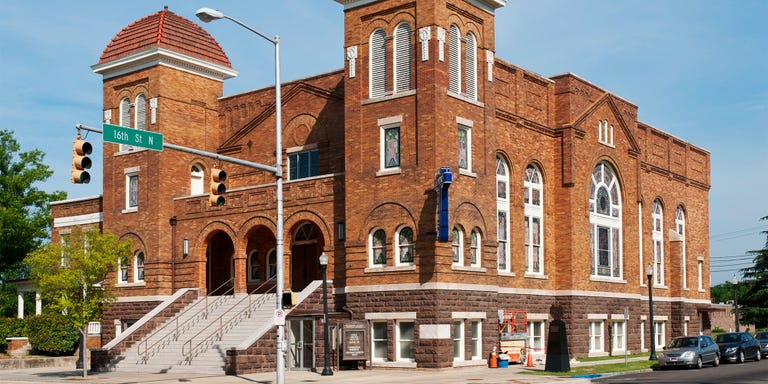 Getty
Getty
By Charles P. Pierce December 11, 2017
BIRMINGHAM, ALABAMA—There are certain iconic places from our history on which we can all pretty much agree—Bunker Hill, Fort McHenry, the Motown studios in Detroit and the Stax studios in Memphis. There are some iconic places from our history that are, at best, unsettling and, at worst, divisive as all hell. We saw that exercised over the past years in places like Liberty Place in New Orleans, where a monument to a successful act of white supremacist terrorism was finally moved into the obscurity it has long deserved.
And then there are certain iconic places from our history that make us avert our moral inner eyes because, while we admire the people that made these places historic, we remain uncomfortable with the situations that made that courage necessary. They put a flinch in our historical memory. Since the 1950s, Alabama has been awash in these places. There is Montgomery, where the bus boycott began. There is the bus station in Anniston, where a mob tried to burn the Freedom Riders to death. There are the stops along Route 80, where the great march from Selma to Montgomery passed in 1965. There is the Edmund Pettus Bridge.
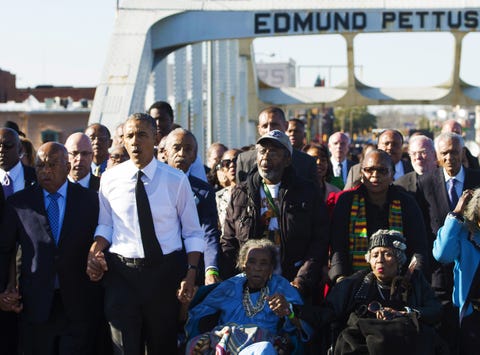
Getty
And there is the 16th Street Baptist Church here in Birmingham, which has been a gathering place for African-Americans since it was finished in 1911. Paul Robeson sang there. W.E.B. DuBois and Mary McLeod Bethune spoke there. And, at 10:22 a.m. on September 15, 1963, a Sunday morning, a group of four white supremacist terrorists planted 15 sticks of dynamite in the church and blew it up, killing four little girls and injuring at least 20 other parishioners, and converted the 16th Street Baptist Church into one of those places that all Americans of a certain age know about instinctively, and one of those places that many Americans talk about with a familiar flinch in their memory.
The flinch keeps too many of us from remembering that this was the third bombing in Birmingham over the previous 11 days, and that the campaign of destruction came in the wake of a federal court decision mandating the integration of Birmingham’s public schools. The flinch keeps us from remembering that the people of the church rebuilt it in less than a year, that a stained-glass window was donated by some people in Wales who were shocked and disgusted by something that had happened in America. The flinch never has left our national mind. It keeps us from remembering that the forces that brought down the walls of the church still maintain a certain destructive power. The flinch is caused by something real, something dark, something alive.

Getty
In the years between 1995 and 1997, the Department of Justice under Bill Clinton was examining a series of arsons that had struck largely African-American churches in the South. The head of the DOJ’s Civil Rights division was a Massachusetts lawyer named Deval Patrick. It was the largest DOJ investigation ever conducted, prior to the probe into the attacks of September 11, 2001. (The investigation resulted in more than 100 arrests, but no evidence of a conspiracy linking the attacks ever was found—which, in some ways, makes the whole thing worse.) During the course of that investigation, Patrick and his team picked up some information regarding suspects in the church bombing who never had been brought to justice.
In 1977, a Ku Klux Klan member named Robert Chambliss had been tried and convicted for his part in the crime, but the FBI and other investigators long had been convinced that Chambliss hardly acted alone. Now, over 30 years later, the FBI went back through the vast files it had accumulated at the time of the bombing. Eventually, two aging Klansmen, Bobby Cherry and Thomas Blanton were arrested and tried for their part in the 16th Street Baptist Church bombing. The two were convicted. Cherry died in prison and Blanton is still there. The prosecutor who put them there was an assistant U.S. Attorney named Doug Jones. He looked at the two old murderers and the flinch was not in him. He put them away.
THE FLINCH IS CAUSED BY SOMETHING REAL, SOMETHING DARK, SOMETHING ALIVE.
On Sunday, in the middle of a crowd on the sidewalk in front of Jones’s Birmingham headquarters, a fine Stetson hat on his head, Armond Bragg was making a lot of noise, leading chants and cheers, and generally having a high old time for himself, listening to Senator Cory Booker. Bragg ran his own pest control business for 30 years until he retired. He did not go in much for politics until Barack Obama ran for president in 2008. Now, though, he has worked day and night for Doug Jones because Armond Bragg remembers when they called his town “Bombingham.” He is a member of the 16th Baptist Church, and, as such, he is not afflicted at all by the flinch.
“I’m a member of the 16th Street Baptist Church and Doug convicted the bombers there back during a time when that wasn’t popular to do, especially for a white man. Then, he prosecuted the guy who bombed the abortion clinic. (Eric Rudolph, who later bombed Olympic Park during the 1996 Olympic Games in Atlanta.) I’ve just been impressed with his career.
“It wasn’t popular to do back in the day. It’s not popular now. Look, you got a guy who’s running who’s got an impeccable record, when you look at his history. And we got on the other side, a guy who’s done everything wrong to tell you the truth. It’s a no-brainer, when you look at the records. When you look at the two individuals, there’s no comparison.
“Doug Jones has run an impeccable campaign. I mean, you can’t just reach for African-American votes. You got to reach into other communities, too. That’s what I think needs to be done. You got to have a man who can go into—well, ‘Flour Country,’ I guess we call it—and also come to the city. Somebody’s got to do that. Doug Jones is that man.”
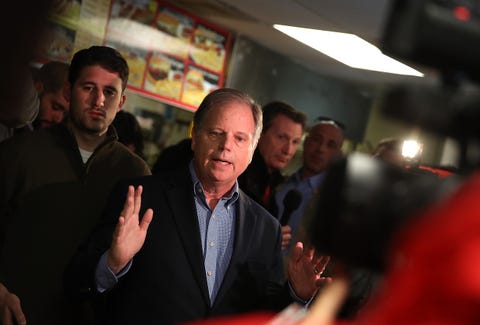
Getty
In so many ways, while Roy Moore is running a ghost campaign, Doug Jones is running a haunted one. He called the entire city out on its flinch, and some people resent the hell out of the fact that he did. He called the anti-choice movement out on its toleration of its wilder fringes, and some people resent the hell out of that, too. But not all the ghosts in our history are evil. The spirits of Addie Mae Collins, Denice McNair, Carole Robertson, and Cynthia Wesley called out over the decades for the peace and the justice they deserved. In 2001, their cries finally were heard.
On his stump speech, Doug Jones often quotes, from memory, a passage taken from The Cure at Troy, Irish poet Seamus Heaney’s magnificent re-imagining of Sophocles’s ancient play, Philocetes.
History says, don’t hope on the side of the grave.’
But then, once in a lifetime, the longed for tidal wave of justice can rise up.
And hope and history rhyme.
Sometimes, that rhyme is an epic poem, an Iliad from inside a Birmingham jail. And sometimes, often, that rhyme is a nursery rhyme, sung by children playing hard at double-dutch, but only after Sunday school is over.




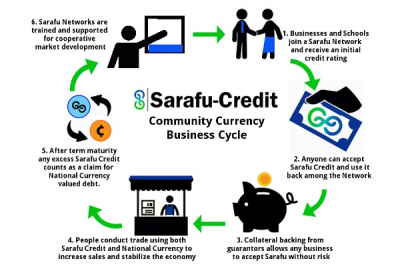
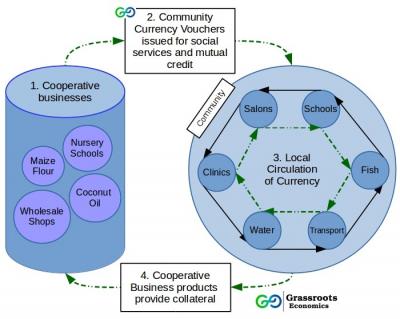


 No wonder she doesn’t look happy. She screwed Mainers and herself.
No wonder she doesn’t look happy. She screwed Mainers and herself. Open sewage in rural Alabama has been blamed for spreading diseases like hookworm and E. Coli. Photo by Philip Alston/UN/Twitter
Open sewage in rural Alabama has been blamed for spreading diseases like hookworm and E. Coli. Photo by Philip Alston/UN/Twitter Illustration by Tom Bachtell
Illustration by Tom Bachtell FILE – In this Oct. 13, 2017, file photo, Education Secretary Betsy DeVos speaks during a dinner hosted by the Washington Policy Center in Bellevue, Wash. DeVos says college students will soon be able to file their applications for federal student aid through a mobile app. DeVos is pledging to modernize the financial aid applications and make it more accessible and simpler. She spoke Tuesday at a conference of student aid professionals in Orlando, Florida. (AP Photo/Ted S. Warren, File)
FILE – In this Oct. 13, 2017, file photo, Education Secretary Betsy DeVos speaks during a dinner hosted by the Washington Policy Center in Bellevue, Wash. DeVos says college students will soon be able to file their applications for federal student aid through a mobile app. DeVos is pledging to modernize the financial aid applications and make it more accessible and simpler. She spoke Tuesday at a conference of student aid professionals in Orlando, Florida. (AP Photo/Ted S. Warren, File)